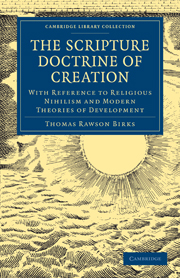 The Scripture Doctrine of Creation
The Scripture Doctrine of Creation Book contents
- Frontmatter
- Contents
- INTRODUCTION
- CHAPTER I ON RELIGIOUS NIHILISM
- CHAPTER II ON RELIGIOUS NIHILISM (continued)
- CHAPTER III THE ALLEGED LAW OF SCIENTIFIC PROGRESS
- CHAPTER IV THE BEGINNING
- CHAPTER V THE CREATION OF MATTER
- CHAPTER VI ON INFINITE SPACE
- CHAPTER VII ON FORCE, LAW, AND NECESSITY
- CHAPTER VIII ON CREATION AND LIFE
- CHAPTER IX ON CREATION AND EVOLUTION
- CHAPTER X EVOLUTION AS AN INDUCTIVE THEORY
- CHAPTER XI ON CREATION BY LAW
- CONCLUSION
CHAPTER VII - ON FORCE, LAW, AND NECESSITY
Published online by Cambridge University Press: 29 August 2010
- Frontmatter
- Contents
- INTRODUCTION
- CHAPTER I ON RELIGIOUS NIHILISM
- CHAPTER II ON RELIGIOUS NIHILISM (continued)
- CHAPTER III THE ALLEGED LAW OF SCIENTIFIC PROGRESS
- CHAPTER IV THE BEGINNING
- CHAPTER V THE CREATION OF MATTER
- CHAPTER VI ON INFINITE SPACE
- CHAPTER VII ON FORCE, LAW, AND NECESSITY
- CHAPTER VIII ON CREATION AND LIFE
- CHAPTER IX ON CREATION AND EVOLUTION
- CHAPTER X EVOLUTION AS AN INDUCTIVE THEORY
- CHAPTER XI ON CREATION BY LAW
- CONCLUSION
Summary
The main contrast between the Christian doctrine of Creation and the theories of modern scepticism turns on the three subjects of Law, Force, and Necessity. Is Force a metaphysical idea to be cast aside, that we may deal with phenomena and their laws, apart from useless abstractions, pure and alone? Must we admit forces, as well as laws of force, but as uncreated, necessary, and eternal? Or do forces and laws of force depend on the First Cause, the Fountain of all power, the Supreme Law giver? Do they contain clear signs, in their own nature, of contingent, originated, and dependent existence? The leading sceptics are not agreed, and offer contradictory substitutes for the ancient creed of Scripture and the whole Church, that “in the beginning God created the heavens and the earth.”
The power and wisdom of the Creator reveal themselves more brightly, the higher we mount in the scale of created being. Man is higher than animals, animals than plants, and plants than lifeless matter. But, on the other hand, the question is simpler and less embarrassed, before we rise to the mystery of life, in that lower field which refers to matter and the medium of light alone. The complexity of nature increases as we rise, and the precise nature of living force remains still very obscure. The unknown bears here a still greater proportion to the known, and thus leaves a wider range for unbelieving theories, which can hide themselves amidst the countless facts and guesses of physiology, like Adam in Paradise, from the unwelcome presence of the living God.
- Type
- Chapter
- Information
- The Scripture Doctrine of CreationWith Reference to Religious Nihilism and Modern Theories of Development, pp. 143 - 174Publisher: Cambridge University PressPrint publication year: 2009First published in: 1872


